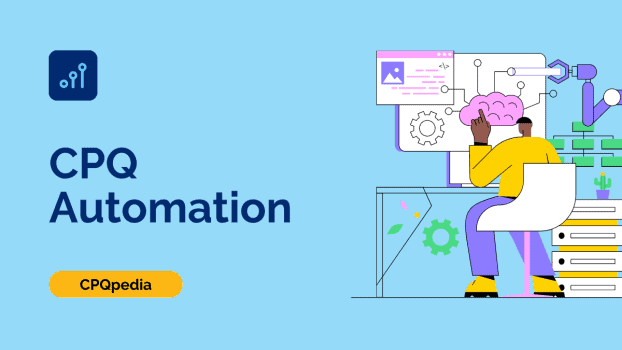What is CPQ Automation?
CPQ automation is the use of CPQ software to eliminate manual processes throughout the CPQ (configure, price, quote) process. CPQ software is a sales tool that helps to streamline the creation, management, and delivery of sales quotes.
At each stage of the CPQ process, CPQ automation entails something different.
Configure: In the configure stage of the CPQ process, CPQ automation primarily focuses on creating, managing, and organizing product data, guidelines, and configurable options. This includes the development of product models that are inclusive of precise pricing data. Product configurations are generated with automated variance checks, ensuring product options’ accuracy and compatibility and avoiding configuration errors.
Price: In the pricing stage, CPQ automation calculates and displays accurate pricing information for customers based on product selection, available discounts, and any additional variables associated with the sale. It also factors in tiered discount levels and incorporates external data to craft personalized pricing models.
Quote: CPQ automation ensures that quotes are always accurate, complete, and timely with current product information, customer profiles, and pricing rules. With CPQ automation, salespeople can instantly generate accurate quotes and related documents with just a few clicks. Automated approval workflows ensure that only quotes meeting certain criteria are sent out, minimizing the risk of misunderstandings or disputes later on.
Synonyms
- Automated configure price quote process
- Sales automation
Why Automate the Configure Price Quote Process
There are three main reasons to automate the CPQ process:
- Better selling experience
- Better buying experience
- Better ongoing customer experience
When a sales rep uses CPQ software, they don’t have to deal with the guesswork, back-and-forth internal communication, or manual quote generation associated with traditional sales processes. When they can spend more time selling and offer their buyers definitive answers quickly, they’re happier.
Buyers generally find it difficult to purchase products from companies that still rely on manual quoting processes. By shortening the sales cycle with CPQ automation, potential customers benefit from a frictionless buying experience with greater transparency.
Automated CPQ solutions often include features such as recurring billing and built-in product maintenance agreements. These features help to create a seamless customer experience, build loyalty, and increase the contract renewal rate, ensuring revenue growth for the company.
Benefits of CPQ Automation
CPQ automation makes life easier for buyers and sellers — but it also yields big returns for businesses in terms of efficiency, accuracy, and cost savings.
Real-Time Pricing
Companies that need to update their pricing based on constantly changing supply and demand factors, market conditions, and price elasticity can’t optimize it manually. Although real-time pricing (RTP) was previously only used in utilities and transportation sectors, Gartner predicts that by 2025, global retailers will begin to use real-time pricing to match changing demand instantaneously.
Other sectors, such as hospitality, transportation, wholesale, and manufacturing, use dynamic pricing (i.e., near-real-time pricing) to maximize profitability while keeping buyers happy.
CPQ software includes powerful pricing engines that help sales reps to quickly find the best price for buyers while keeping margins intact.
Faster Quote Generation
Quote generation can take sellers hours, especially for services and complex products. Using quote templates and plug-and-play information, CPQ automation can help sales reps to generate complex quotes and contracts quickly — typically in 10 minutes or less.
Faster quote generation leads to faster closing times, greater customer satisfaction, and more revenue for the company.
Improves Quote Accuracy
Accurate quotes can make or break a deal — customers don’t want to go back and forth with a seller, and they certainly don’t want to be told about a price increase or a mistake in product availability at the last minute.
Automated CPQ workflows that sync product data from ERP and/or customer data from CRM systems ensure all quotes are up-to-date and accurate. This minimizes time-consuming back-and-forth emails, reduces the chance of misunderstandings or disputes, and generally leads to better customer satisfaction.
Reduces Approval Time
The traditional approval process has two main drawbacks:
- Sellers need to wait (sometimes days) for leadership to approve a new quote.
- Accidentally sending a quote with incorrect price or product specifications, negatively affects the deal.
CPQ automation streamlines the approval process by setting up automated rules for various scenarios. Quotes can be sent to sales managers and approved or rejected in minutes, reducing turnaround time and ensuring accuracy at every step of the way.
Improves Customer Experience
Complex B2B sales involve three stakeholder groups, each with multiple members. Every member of these buying groups has different needs and preferences, but they all share one common goal: to make the purchase process as smooth as possible.
To come to a buying decision, every stakeholder needs to be on the same page — a difficult task when they typically work in separate departments and at different rungs of the corporate ladder.
CPQ automation replaces easy-to-miss email threads with a unified platform for collaborative selling and sales engagement.
Post-purchase, CPQ automates the billing and subscription management processes, allowing customers to access their billing information, check their subscription status, and make changes to their subscriptions without talking to the sales team.
Increases Sales Efficiency and Productivity
Sales reps spend just 28% of their time on actual selling activities, according to Salesforce’s fifth State of Sales report. An automated CPQ solution eliminates the time-consuming activities associated with manual quoting, such as researching product specs, configuring discounts and promotions, creating quotes in multiple formats, and getting approval.
When sellers can focus more on the sales process, they are more productive and happier with their jobs.
Reduces Costs
A cost reduction of 10% to 15% is standard with any process automation initiative. CPQ automation increases sales efficiency while reducing IT infrastructure, hardware, and software costs.
Most importantly, CPQ software is generally a low- or no-code solution. Coding skills aren’t usually required to set up a CPQ system, which keeps the setup and maintenance costs low.
Automating many of the time-consuming manual tasks involved in the sales process means salespeople can spend more time on high-value activities, such as building customer relationships and closing deals, and less time on configuring products, calculating prices, and generating quotes.
This can translate into cost savings in two ways: either by enabling a smaller sales force to achieve a similar or higher output or by increasing the output of the existing sales force, increasing sales revenue while maintaining labor costs.
Increases Average Order Value
CPQ bundles the right products together, helping sellers find cross-sell and upsell opportunities.
Consider a project management software company with a three-tier pricing structure (basic, professional, and enterprise). They also sell add-ons, including comprehensive features for Agile project management, additional storage, and agency-specific workflows.
The seller learns that their customer runs a large-scale marketing agency with dozens of clients and hundreds of projects.
With CPQ automation, the seller can configure a bundle with the enterprise-level project management software and the agency package, increasing the average deal size while providing more value to the buyer.
Frictionless Ordering Process
Gartner studied the B2B buying journey and found that the vast majority (77%) of buyers found their last purchase to be “very difficult.” This underscores a massive disconnect between buyers and sellers — even in the age of digital transformation, making a purchase is still a cumbersome process for most B2B buyers.
CPQ makes interactions with sellers easier, while self-service website integrations help customers create a configurable product and make purchases on their own time.
What to Look for in CPQ Automation Software
For CPQ automation to move customers through the sales pipeline and retain them long-term, it needs to have the right features. Although the necessary specialization and features vary from company to company, a few similarities stand out.
Ease of Use
Implementing any new software entails a learning curve. To ensure companywide software adoption and long-term success with CPQ automation, the software needs to be easy to use.
Generally, CPQ vendors will take care of the implementation and company onboarding processes, but the responsibility falls on the business when it comes to keeping the system up-to-date and implementing sales best practices.
Low-Code Solution
Unless a company has extensive IT infrastructure, highly trained developers, and an intricate tech stack with customized solutions, CPQ automation should be relatively straightforward.
Document generation, quote management, dynamic pricing, approvals, rules-based functions, and integration should be possible without code.
More complex tasks (such as integrating a product configurator on the company website) might require some coding but should still have ready-made, drag-and-drop components.
Implementation Support
CPQ software vendors should provide resources and guidance for businesses to implement their CPQ solution. This might include best practices, training courses, and customer success programs.
Vendors should also offer ongoing software maintenance, which includes product updates, bug fixes, and security patches so that companies can keep up with market trends and tech innovations.
Scalability
CPQ automation should be able to handle the demands of growing offices (or companies expanding to new regions). It should also be able to expand with the company as its customer base grows and/or product catalogs become more complex.
A CPQ automation platform should support a variety of languages, currencies, and payment methods, enabling companies to do business with international customers and get paid by domestic customers as easily as possible.
Integrations
CRM integration is the most common CPQ automation tool, but many CPQ solutions also integrate with ERP systems, sales enablement tools, analytics, and BI tools.
Unifying data ensures consistent pricing in customer quotes, a continuous data flow that accurately reflects current product availability and pricing models, and real-time reporting.
FAQs
CPQ does not usually require much coding. Website integrations and custom features may require some coding, but most companies are able to use CPQ software without having extensive IT infrastructure.
Sales automation tools comprise a range of automated processes and features that improve sales productivity. The most basic example is an automated email campaign, which automates the process of sending emails to prospects at a cadence. More advanced tools include CPQ automation, pricing optimization software, workflow automation, sales enablement, and analytics.

Andrew is a professional copywriter with expertise in creating content focused on business-to-business (B2B) software. He conducts research and produces articles that provide valuable insights and information to his readers.

